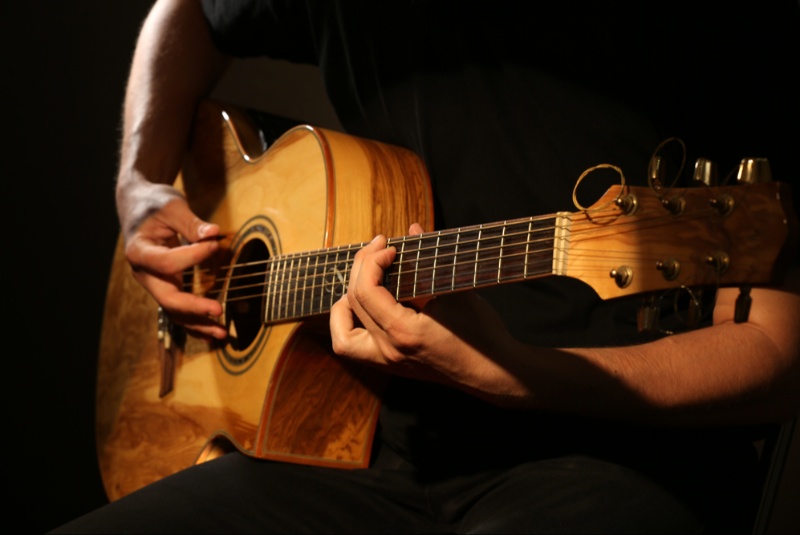Buying the perfect acoustic guitar as a beginner can be a thrilling yet daunting experience. With a plethora of options available, it's easy to feel overwhelmed. This guide aims to streamline the process, ensuring you make an informed decision that suits your musical journey.
Understanding Acoustic Guitar Types
- Classical Guitars: Often recommended for beginners, classical guitars have nylon strings, which are softer on the fingers compared to steel strings. They produce a warm, mellow sound, ideal for classical and flamenco music.
- Steel-String Acoustic Guitars: These guitars are known for their versatility and are widely used in folk, country, and rock music. They have a crisper, louder sound compared to classical guitars but can be tougher on the fingers for beginners.
- Acoustic-Electric Guitars: These guitars can be plugged into an amplifier or PA system, making them suitable for live performances. They offer the same playability as an acoustic guitar but with added versatility.
Factors to Consider When Buying an Acoustic Guitar
- Budget: As a beginner, it's wise to start with an affordable model. Guitars in the $100-$300 range often provide good quality for beginners. However, investing a little more can sometimes offer better playability and sound.
- Size and Shape: Acoustic guitars come in various sizes and shapes, affecting playability and sound. Dreadnought guitars are popular for their versatile, bold sound, while concert and grand concert guitars are smaller and comfortable for players with a smaller frame.
- Wood Type: The wood type influences the guitar's sound. Common woods include spruce (bright and versatile), cedar (warm and mellow), and mahogany (rich and punchy). Each wood type offers a unique tonal characteristic.
- String Action: String action refers to the height of the strings above the fretboard. Lower action is easier on the fingers, making it preferable for beginners. However, too low action can cause buzzing.
- Neck Width and Length: The neck's width and length can impact playability, especially for those with smaller hands. Classical guitars typically have wider necks, while steel-string guitars have narrower options.
- Tuning Stability: A guitar that stays in tune is crucial for a rewarding playing experience. Look for guitars with quality tuning machines.
- Aesthetic Appeal: While sound and playability are paramount, the guitar's look can also be an important factor, as a visually appealing instrument can inspire you to play more often.
Additional Considerations
- Accessories: Some guitars come as part of a bundle with accessories like a gig bag, tuner, strap, and picks, which can be cost-effective for beginners.
- Brands and Reviews: Research and read reviews of different brands. Brands like Yamaha, Fender, and Taylor offer excellent beginner models.
- Testing Before Buying: If possible, try playing or at least holding various guitars to see which feels best. What feels comfortable is often more important than technical specifications.
- Online Resources: Utilize online resources and communities for additional guidance and reviews.

Maintenance and Care
- Store your guitar in a stable environment, avoiding extreme temperatures and humidity.
- Regularly clean your guitar with a soft cloth.
- Change strings periodically, as old strings can affect sound quality and playability.
Learning Resources
As a beginner, you'll need resources to learn how to play. Consider:
- Online Tutorials: Websites like YouTube have countless tutorials for beginners.
- Music Schools: Local music schools or community centers often offer guitar lessons.
- Guitar Apps: Apps like Yousician and Fret Trainer can be helpful tools for learning.
The Role of Guitar Sound and Tonality in Your Musical Journey
When selecting an acoustic guitar, the sound and tonality are crucial aspects to consider. Every guitar has its unique voice, which should resonate with the style of music you aspire to play.
- Bright vs. Warm Tones: Guitars with brighter tones, often produced by spruce tops, are suitable for a punchy, articulate sound, ideal for strumming and folk music. In contrast, warm tones, typically from cedar or mahogany, are better for fingerstyle and softer music.
- Experimenting with Different Woods: Each wood type offers a distinct sound. Spruce is known for its clarity and dynamic range, while mahogany provides a warmer, earthier tone. Experimenting with different woods can help you understand what sound you prefer.
- The Impact of Guitar Size on Sound: The size of the guitar also impacts its sound. Larger guitars like dreadnoughts offer more volume and bass, whereas smaller guitars like parlor models provide a more focused and intimate sound.
- Understanding the Importance of Bracing: The guitar’s bracing pattern, often overlooked, significantly affects its sound. X-bracing, for example, offers a balanced tone suitable for a variety of playing styles.
How to Find the Right Guitar Fit and Comfort for You
The physical comfort of playing a guitar is as important as its sound. The right fit ensures that your learning process is enjoyable and not hampered by physical strain.
- Body Size and Shape: The guitar’s body size should match your comfort level. For smaller-framed individuals, a concert or parlor guitar might be more suitable than a full-sized dreadnought.
- Neck Profile and Scale Length: The neck’s thickness and length can affect playability. A slimmer neck may be easier for beginners or players with smaller hands.
- The Right String Type: For beginners, nylon strings might be more forgiving than steel strings. However, the choice should also align with the music genre you prefer.
- Ergonomics and Playing Posture: It’s important to consider how the guitar feels when you’re sitting or standing. Proper ergonomics can prevent discomfort and injuries.
Choosing your first acoustic guitar is a personal journey. It's about finding the right balance between budget, comfort, sound, and aesthetics. Remember, the best guitar is the one that you feel inspired to play every day. With the right instrument in hand, you're well on your way to embarking on a fulfilling musical adventure.




